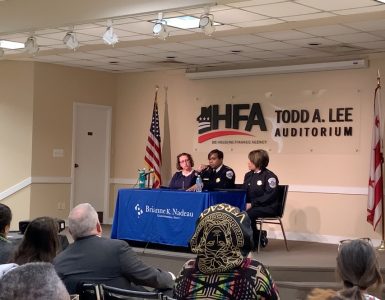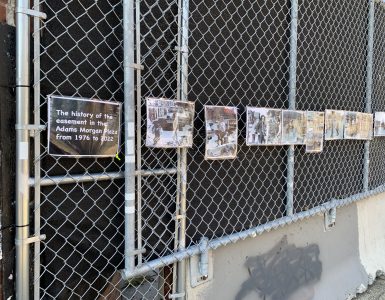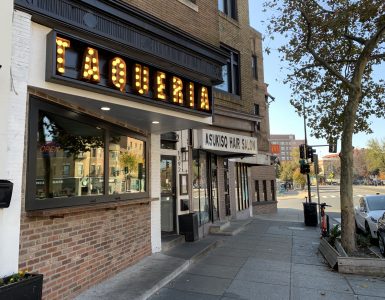A blue Buffalo Bills flag hangs outside the Grand Central bar in Adams Morgan. On Sunday, as the Bills triumphed over the Kansas City Chiefs, Grand Central was marking its first weekend hosting sports wagering after obtaining a license from the District.
Thursday through Sunday also included Major League Baseball playoffs, college football and a fight between boxers Tyson Fury and Deontay Wilder III. Grand Central owner Brian Vasile, who’s from Upstate New York, said he thinks the weekend was great for business.
“People have been wagering on sports forever,” Vasile said. “The opportunity to add that to what we do here as an entertainment feature for our customers is just another revenue stream and another offering that I can give folks who come here.”
D.C. is one of dozens of U.S. states and territories to legalize sports wagering after a Supreme Court decision in 2018 gave them that option. The practice, which was outlawed throughout most of the United States in 1992, has become a way for governments to earn tax revenue.
Peter Alvarado, director of the D.C. Office of Lottery and Gaming’s Regulation and Oversight Division, said at an Adams Morgan neighborhood commission meeting Wednesday that the District wants to ensure sports wagering licenses benefit residents and the District.
Businesses applying for a sports wagering license have to submit a security plan to the District, Alvarado said. They are required to have security cameras inside, for example.
Ben Butz, a commissioner for the advisory neighborhood commission representing Adams Morgan, said Wednesday that he hopes the Office of Lottery and Gaming communicates more with the commissioners for future sports wagering license applications.
Although Butz didn’t have objections to the District granting Grand Central its sports wagering license, he wished he knew about the application earlier on in the process.
Sarah Fashbaugh, community resource officer for D.C.’s Alcoholic Beverage Regulation Administration, which adds input when businesses apply for a sports wagering license, said during the meeting that residents can protest business’ bids for renewed sports betting licenses.
Alvarado said the Office of Lottery and Gaming discussed at an internal meeting how to communicate more with commissioners when applications are under review.
“In these cases, we should probably reach out and solicit some comment from the local ANC,” he said.
The practice of sports wagering has historically been tainted by controversies such as the Black Sox Scandal, when Chicago White Sox players were accused of throwing games for money in the 1919 World Series against the Cincinnati Reds.
“The leagues have always argued that sports gambling is bad and that for the integrity of the game, they need to prevent it,” said John Wolohan, a professor of sports law at Syracuse University.
Now, sports leagues are increasingly embracing the practice, Wolohan said.
James Kahler, a sports betting education expert at Ohio University, said most people who place sports bets don’t expect to win. He said it’s a source of entertainment that can now benefit state economies.
“Sports wagering has just become a bigger part of the mainstream of sport,” Kahler said.
The 2008 financial crisis marked a turning point in which states were looking for ways to earn more from tax revenue, Wolohan said.
That led New Jersey to look toward sports betting as a potential source of revenue. The fight culminated in the Supreme Court overturning the Professional and Amateur Sports Protection Act, which then-President George H.W. Bush signed into law in the 1990s.
In the District, the first $200,000 of tax revenue generated from sports wagering will go to the Department of Behavioral Health to help treat gambling addictions, according to the National Conference of State Legislatures.
Applicants for sports wagering licenses have to submit a $100,000 fee to the District, which can be a heavy lift for businesses, Vasile said.
“If you’re comfortable with the $100,000 fee, if you’re comfortable with your business model and adding this as a feature, then I’d say go ahead and apply,” Vasile said.
Customers interested in placing a bet for next weekend at Grand Central can look forward to another medley of college football, NFL and MLB games.















the ability to seamlessly switch between casino games and placing bets on sporting events adds a dynamic layer to the entertainment.